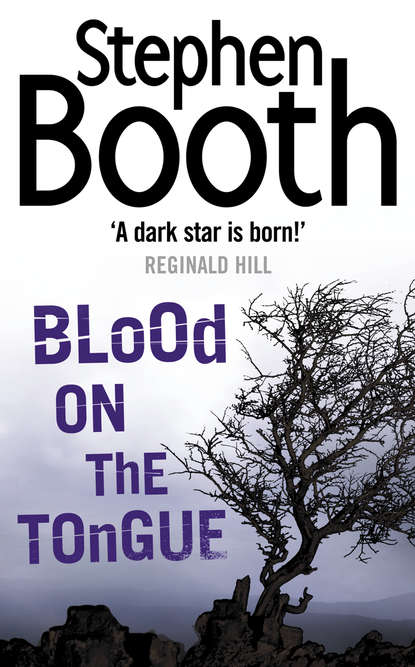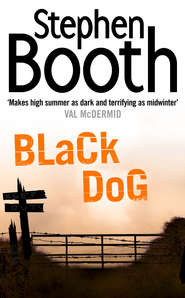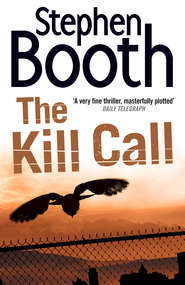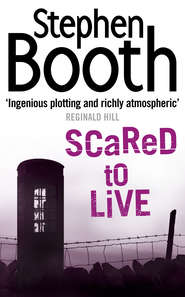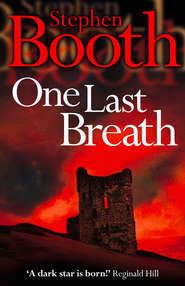По всем вопросам обращайтесь на: info@litportal.ru
(©) 2003-2024.
✖
Blood on the Tongue
Автор
Год написания книги
2019
Настройки чтения
Размер шрифта
Высота строк
Поля
‘Ineed to study the configuration of the major wound more closely before I can be certain of anything.’
‘I’m not sure what you mean by that.’
‘Circumstantial evidence,’ said Mrs Van Doon. She pointed at one of the plastic bags containing the victim’s clothes. ‘Your inspector was also wrong when he said there was no blood. There was blood. Not much, but some. It wasn’t noticeable at the scene because it had been absorbed by his clothing. He was wearing a thermal vest, a shirt and cotton sweater. A small amount of blood had penetrated the layers of clothing to stain the inner lining of his suit jacket, which is why it wasn’t visible. It was lucky that he had been dead for some time when the snowplough hit him. If there had been a lot of bleeding from the major wound, I might not have noticed anything.’
Fry was listening carefully, trying to work out the direction of the pathologist’s thinking. ‘Do you mean you think there is an earlier wound which has been masked by the later one?’
‘Exactly. At least, that is one theory I’ll be exploring. The edge of the snowplough blade is regular in shape. I’m told it’s a new one, which is useful. But there’s an irregularity in the shape of the wound which matches the position of the bloodstain on the clothing. We need to do some matching. And I need to go deeper into the tissues to tell you more.’
‘Deeper? A knife?’
‘Possibly. My conclusions will be in my report.’
‘So he was stabbed, then dumped from a vehicle.’
‘If that’s the case, then it helps your time frame, too, doesn’t it?’
‘But he was already dead some time before he was found …’
‘Yes, but if he was dumped from a vehicle, when was he dumped? My impression from the scene was that the body would have been in full view of passing traffic, if it hadn’t been for the snow. But then, I suppose there was no traffic on that road after the snow had fallen.’
Fry thought carefully about what she was saying. ‘If somebody dumped him, it has to have been when it was already snowing heavily enough to have discouraged drivers from attempting the Snake Pass, so that there was no one passing to be a witness. Probably the snow-warning lights at the bottom of the road were already on, so drivers were turning back. We can check what time they were switched on. But it also has to have been before the road became completely impassable. In a heavy fall of snow, that can’t have been more than a half-hour window of opportunity. And we have to be looking for a four-wheel drive vehicle of some kind. No one in his right mind would have risked it otherwise. They could have found themselves stranded up there with a dead body in the boot. That narrows it down a lot. Thank you.’
Mrs Van Doon brushed a stray lock of hair from her forehead and smiled tiredly. ‘You can deduce so much from a small amount of blood,’ she said. ‘I agree with your inspector on that, at least. Blood does make a body rather more satisfactory.’
Ben Cooper escorted the visitors back down the stairs and along the corridor towards reception. Alison Morrissey walked quickly, looking straight ahead, but Frank Baine tended to linger, glancing curiously into the offices they passed. Cooper was eyeing the slim black briefcase that Morrissey carried. He would have loved to get hold of all the files that he had glimpsed in there, and to immerse himself in the details of the story whose surface they had barely scratched during the meeting. The LIO’s briefing had been good, but it didn’t tell him anything about the human dimensions of the tragedy, which he could see were what drove Alison Morrissey.
As soon as the thought crossed his mind that Morrissey might let him read the files if he asked her, Cooper dismissed the notion as mere escapism. There was more than enough for him to do right now. Just because something interested him, it didn’t mean it was his job to look into it.
As Cooper held open the security door for the visitors to leave, Morrissey turned to look at him. Her gaze was direct and disconcerting. He felt as though she were seeing him fully, reading everything about him from his face and his manner, in a way that people rarely did. Cooper self-consciously straightened his shoulders and felt the beginnings of a flush rising in his neck.
‘And what did you think?’ she said. ‘Wouldn’t you want to know what happened?’
‘It’s not my job to take a view on the subject,’ said Cooper. ‘I just do what I’m told.’
She stared at him, with a small, sceptical smile. He hadn’t been sure before, but now he could see that her eyes were pale grey. Cooper felt uncomfortable, unable to move from his position until Morrissey and Baine had passed through the door. But Baine was hanging back, watching them patiently. Morrissey held her gaze for a moment longer.
‘That’s a shame,’ she said.
Cooper felt as though he had been summed up and found wanting. He watched Morrissey walk briskly across the reception area, looking like a smart business executive with her black suit and briefcase. Frank Baine stopped in the doorway.
‘Take my business card,’ he said. ‘In case I can help.’
Cooper took the card almost absent-mindedly. ‘Thanks.’
Then Baine leaned towards him, nodding slyly towards the disappearing figure.
‘And remember – there’s no stopping a woman when her passion is roused,’ he said.
Eden Valley Books was in Nick i’ th’ Tor, one of the cobbled passages running between Edendale market square and the Eyre Street area. The bookshop was a high, narrow building that looked as though it had been jammed between two much wider ones as an afterthought, or a mere space-filler – something to use up all the leftover oddments of stone when the builders had finished work on the Yorkshire Bank next door. But it was three storeys high, with books on the first two floors, and from the tiny windows set into the gabled roof, it looked as though there were attic rooms, too. Ben Cooper recalled there was even a cellar that ran under the street, full of more books.
There were bookshops in Edendale that were more modern, but Cooper had browsed in Eden Valley Books many times, and he was hopeful he would find what he wanted here, even during the half-hour he could spare during his lunch break. The owner, Lawrence Daley, seemed to specialize in gathering together obscure books on esoteric subjects.
The concept of a window display hadn’t reached Eden Valley Books yet. All Cooper could see through the streaked glass were the ends of some wooden bookshelves plastered with fliers advertising local events which had taken place several months ago. A concert by a folk group, a psychic evening at the community centre, an autumn fair in aid of the Cats Protection League.
The snow in Nick i’ th’ Tor was rapidly turning to slush, and water ran down the cobbles into the square. The front door of the bookshop was narrow, and it stuck in the frame when he tried to open it, so that he had to lean his weight against it before it gave way. It reminded him more of a defensive bastion than of an entrance – especially when a warning bell jangled above his head, causing a nervous stirring somewhere inside the shop.
Immediately, Cooper was surrounded by books. They were crammed on to shelves right in the doorway, so that he couldn’t get past without brushing against them. Further in, the tiny rooms had been stuffed with books from floor to ceiling. They were piled on the floor and on the bare wooden stairs, and no doubt they filled the upper rooms as well. On a table, Cooper saw a set of Enid Blyton’s Famous Five stories and a 1935 almanac with board covers mottled with mould. There was an overwhelmingly musty smell of old paper – paper that had soaked up the damp from many decades spent in unheated stone houses on wet hillsides.
‘Hello?’ called Cooper.
Lawrence Daley wore a silk waistcoat with a fancy pattern that was none too clean, and his brown corduroy trousers had become baggy at the knees from hours of crouching to reach the lower shelves. On occasions, Cooper had seen Lawrence wearing a bow tie. But today he had an open-necked check shirt, with his sleeves rolled back over pale forearms. His hair was uncombed, and he looked dusty and sweaty, as if it were the height of summer outside with the temperature in the eighties, rather than creeping up from zero towards another snowfall.
‘I’ve been trying to sort out the Natural History section,’ said Lawrence when he saw Cooper appear round the stacks. ‘Some of these books have been here since Granny’s day. They’re still priced in shillings, look. A customer brought one to me yesterday and insisted on paying fifteen pence for it. I couldn’t argue, because that was what the price on the label converted at in new money.’
‘Are you throwing them out?’ asked Cooper, wrinkling his nose at the musty smell and the cloud of dust that hung in the air.
‘Throwing them out? Are you kidding? I can’t throw them out. They just need re-pricing.’
‘But if they’ve been here since your grandmother ran the shop …’
‘I know, I know. They’re not exactly fast sellers. But if that were all I was interested in, I’d stack the place to the ceiling with Harry Potters, like everyone else does. It’s Detective Constable Cooper, isn’t it?’
‘Ben Cooper, yes. I wondered if you had any books on aircraft wrecks. There are so many wrecks around this area – there must be something published about them.’
‘If you go right to the back and through the curtain on the left, then down a few steps, you might find something halfway up the shelves,’ said Lawrence.
‘Thanks.’
Cooper made his way through the aisles of books. He passed Poetry and Literature, Biography and Philosophy, until he reached a dead end at Geography. He turned left at Art and found Music lurking in a curtained-off alcove at the head of a flight of stairs leading down into a cellar. The sides of the stairwell had been filled with more bookshelves. A few creaky steps down, Cooper came across Air Transport. It seemed a curiously modem subject for Eden Valley Books, and he wasn’t surprised that it was hidden away. He looked down into the darkness at the bottom of the stairs and wondered what Lawrence had chosen to confine to the cellar. Probably something like Computers and Information Technology.
But there, sure enough, were two slim volumes on Peak District aircraft relics, exactly what he wanted. He wondered if this place was really some kind of Aladdin’s Cave where you could find anything you truly wanted, if you wished hard enough. Lawrence Daley made a strange genie, though.
‘Just the thing, Lawrence,’ he said, when he had made his way back to the counter. ‘I found two.’
‘Amazing,’ said Lawrence. ‘And is there a price on them?’
‘Well, no actually.’
Lawrence sighed. ‘Then I can’t charge you anything at all, can I?’
‘Of course you can.’
‘Not if there’s no label. It’s against the Trade Descriptions Act.’
‘I’m not sure that’s how it works,’ said Cooper. ‘Anyway, I can’t take them without paying you for them.’
‘Well, fifty pence then.’





